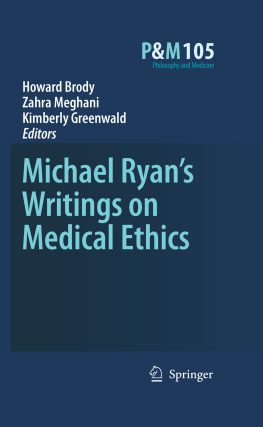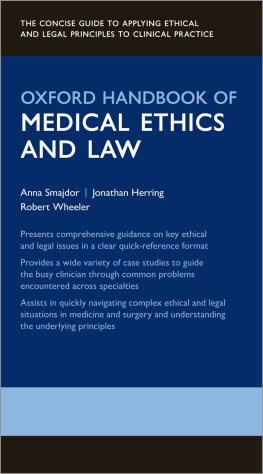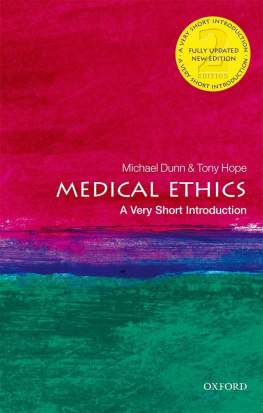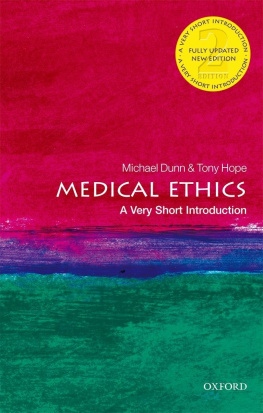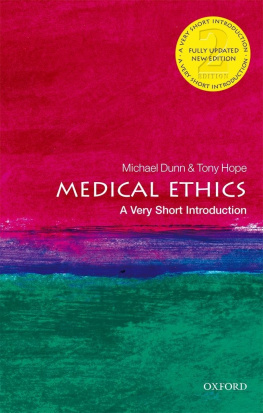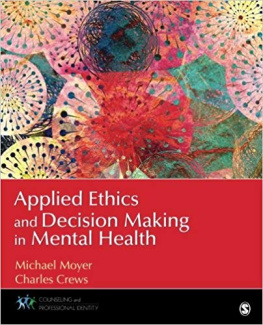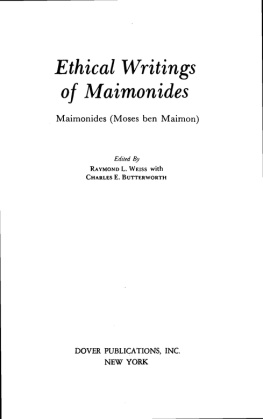Howard Brody , Zahra Meghani and Kimberley Greenwald (eds.) Philosophy and Medicine Michael Ryan's Writings on Medical Ethics 10.1007/978-90-481-3049-8_1 Springer Science+Business Media B.V. 2009
His contemporaries remembered Michael Ryan (d. 1840) as an Irishman, a learned and kind-hearted colleague, a prolific writer, editor of the London Medical and Surgical Journal , and a colorful disputationist who regularly went toe-to-toe with Thomas Wakley (17951862), the acerbic and outspoken founding editor of The Lancet . Later historians identified him as one of the founders of modern medical ethics, and the first to link the medical ethics of his own day with the historical tradition of the Hippocratic Oath. Ryan was a seminal figure in the development of medical jurisprudence and an original thinker on research ethics, apparently the first to publicly defend the necessity of obtaining the informed consent of the research subject. Ryan appears to have been the only person in Great Britain, during the middle years of the nineteenth century, to attempt to produce a systematic account of medical ethics, for use especially by medical students. While relatively little of his thinking was original, Ryan is noteworthy for addressing medical ethics under the broader rubric of medical jurisprudence, identifying some important ethical issues in his other special-interest area, obstetrics, and breaking some new ground with his ethical reflections. He also advocated addressing medical ethics as a critical portion of the curriculum for medical students.
His contemporaries remembered Michael Ryan (d. 1840) as an Irishman, a learned and kind-hearted colleague, a prolific writer, editor of the London Medical and Surgical Journal , and a colorful disputationist who regularly went toe-to-toe with Thomas Wakley (17951862), the acerbic and outspoken founding editor of The Lancet . Later historians identified him as one of the founders of modern medical ethics, and the first to link the medical ethics of his own day with the historical tradition of the Hippocratic Oath. Ryan was a seminal figure in the development of medical jurisprudence and an original thinker on research ethics, apparently the first to publicly defend the necessity of obtaining the informed consent of the research subject.
Ryan appears to have been the only person in Great Britain, during the middle years of the nineteenth century, to attempt to produce a systematic account of medical ethics, for use especially by medical students. While relatively little of his thinking was original, Ryan is noteworthy for addressing medical ethics under the broader rubric of medical jurisprudence, identifying some important ethical issues in his other special-interest area, obstetrics, and breaking some new ground with his ethical reflections. He also advocated addressing medical ethics as a critical portion of the curriculum for medical students.
When, around 1830, Michael Ryan began to compile a work on medical ethics, the subject was dominated by two figures from the end of the eighteenth century, John Gregory (17241773) and Thomas Percival (17401804). These writers, in turn, were heavily influenced by the philosophy of the Enlightenment period, especially as it was formulated in Scotland. The ethics of the Scottish Enlightenment generally, and the work of Gregory and Percival in particular, therefore provide a context for Ryan's role in the history of medical ethics.
Understanding the ethical writing of the Scottish Enlightenment is very challenging for us at the start of the twenty-first century. It is difficult not to see the Enlightenment through the prism of whatever issues most concern us today. For example, we imagine that writings on ethics can be divided generally into theoretical and practical works, and that practical works can be subdivided into those that are clearly based on or derived from theory, and those that are not. We also imagine that a fundamental feature of medical ethics is the physician-patient (or patientphysician) relationship, and that the extent to which the physician does or does not respect the autonomous wishes and choices of the patient is a major line of demarcation between an old ethic, such as is suggested in the Hippocratic Oath, and a modern ethic suitable for today's practice.
Adopting this presentist perspective, we might conclude several things about Gregory and Percival. Since Gregory seems to attend more to the physicianpatient relationship, while Percival focuses on relationships among physicians, we might conclude that Gregory is a pioneer of modern medical ethics while Percival is primarily a conservative figure from the Hippocratic past. We might also see in Gregory more explicit mention of various theoretical strands of ethical thought and conclude that his ethical writings are theoretically grounded in a robust way, while Percival represents a merely practical or applied medical ethics.
While it is ultimately impossible to stand free from our present vantage point, we may at least approximate an interpretation that better situates medical ethics within the intellectual life of the late eighteenth century. This latter interpretation might see Gregory and Percival, despite their differences, as allied within a single tradition of thought. Both are transition figures at the intersection between an old, guild-based medicine and modern institutional and professional medicine.
The educational background of Gregory and Percival shaped their thinking on medical ethics. They both did some of their medical training at the University of Edinburgh, which Ryan attended several decades later. Edinburgh was the home of the Scottish Enlightenment culture. The medical school had inherited the mantle previously held by Herman Boerhaave (16681738) and the University of Leiden, as the dominant school for teaching modern medicine. Since English and Scottish thinkers in the eighteenth century were distrustful of grand systems, Hippocrates was held up as a model of the physician who allowed himself to be taught by nature and not by theory.
Edinburgh influenced its graduates in several more concrete ways. The Edinburgh system allowed access to medical school for religious dissenters, while Oxford or Cambridge accepted only those who would subscribe to the Church of England faith. Lectures were given in English rather than in Latin, which remained the language of instruction in the English as well as many continental universities. Professors were not paid on a salary basis, but supplemented their clinical practice incomes with fees collected from students for admission to their courses of lectures. As a result the professors tended to give more practical and appealing lectures, and were actively involved in the life of the university and community.
Gregory and Percival shared an immersion in the ethical thinking and writing of the Scottish Enlightenment, led by figures including Francis Hutcheson (1694 1746) and Gregory's cousin, Thomas Reid (17101796). Their ethical thinking flowed seamlessly into a natural-law view of both science and religion. Neither Gregory nor Percival thought it possible to have ethics without a religious basis. Both were apolitical and represented the conservative Enlightenment. They had no wish to overturn the social order that seemed to provide a stable home both for the medical profession and the advancement of medical science, and for civilized life generally.

